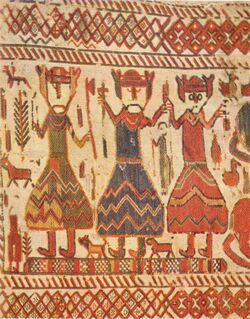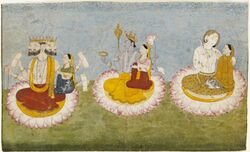Religion:Triad (religious)
From HandWiki
A Triad, in a religious context, refers to a grouping of three gods, usually by importance or similar roles. A triad of gods were usually not considered to by one in the same being, or different aspects of a single deity as in a Trinity or Triple deity. Triads of three closely associated deities were commonly found throughout the ancient world, and in particular in the religious traditions of Ancient Greece and Egypt.[1]
List of deity triads

This part of a 12th-century Swedish tapestry has been interpreted to show, from left to right, the one-eyed Odin, the hammer-wielding Thor and Freyr holding up an ear of corn.[2]
Historical polytheism
- The Classical Greek Olympic triad of Zeus (king of the gods), Athena (goddess of war and intellect) and Apollo (god of the sun, culture and music)[3][4]
- The Delian chief triad of Leto (mother), Artemis (daughter) and Apollo (son)[5][6] and second Delian triad of Athena, Zeus and Hera[7]
- The Eleusinian Mysteries centered on Persephone (daughter), Demeter (mother), and Triptolemus (to whom Demeter taught agriculture)
- In ancient Egypt there were many triads:
- the Osirian (or Abydos) triad of Osiris (husband), Isis (wife), and Horus (son),[8]
- the Theban triad of Amun, Mut and Khonsu
- the Memphite triad of Ptah, Sekhmet and Nefertem
- the Elephantine triad of Khnum (god of the source of the Nile river), Satet (the personification of the floods of the Nile river), and Anuket (the Goddess of the nile river).
- the sungod Ra, whose form in the morning was Khepri, at noon Re-Horakhty and in the evening Atum, and many others.[9]
- The Hellenistic Egypt triad of Isis, Alexandrian Serapis and Harpocrates (a Hellenized version of the already referred Isis-Osiris-Horus triad), though in the early Ptolemaic period Serapis, Isis and Apollo (who was sometimes identified with Horus) were preferred.[10]
- The Roman Capitoline Triad of Jupiter (father), Juno (wife), and Minerva (daughter)
- The Roman pleibian triad of Ceres, Liber Pater and Libera (or its Greek counterpart with Demeter, Dionysos and Kore)
- The Julian triads of the early Roman Principate:
- Venus Genetrix, Divus Iulius, and Clementia Caesaris
- Divus Iulius, Divi filius and Genius Augusti
- Eastern variants of the Julian triad, e.g. in Asia Minor: Dea Roma, Divus Iulius and Genius Augusti (or Divi filius)
- The Matres (Deae Matres/Dea Matrona) in Roman mythology
- The Fates, Moirai or Furies in Greek and Roman mythology: Clotho or Nona the Spinner, Lachesis or Decima the Weaver, and Atropos or Morta the Cutter of the Threads of Life. One's Lifeline was Spun by Clotho, Woven into the tapestry of Life by Lachesis, and the thread Cut by Atropos.
- The Hooded Spirits or Genii Cucullati in Gallo-Roman times
- The main supranational triad of the ancient Lusitanian mythology and religion and Portuguese Neopagans made up of the couple Arentia and Arentius and Quangeius and Trebaruna, followed by a minor Gallaecian-Lusitanian triad of Bandua (under many natures), Nabia and Reve female nature: Reva[11]
- The sisters Uksáhkká, Juksáhkká and Sáhráhkká in Sámi mythology.
- The triad of Al-Lat, Al-Uzza, and Manat in the time of Mohammed (Holy Qu'ran (Abdullah Yusuf Ali translation), Surah 53:19-22)[12]
- Lugus (Esus, Toutatis and Taranis) in Celtic mythology
- Odin, Vili and Ve in Norse mythology
- The Norns in Norse mythology
- Odin, Freyr, and Thor in Norse mythology. Odin is the god of wisdom and knowledge, Freyr is the god of fertility and prosperity, and Thor is the god of thunder and strength.
- The Triglav in Slavic mythology
- Perkūnas (god of heaven), Patrimpas (god of earth) and Pikuolis (god of death) in Prussian mythology
- The Zorya or Auroras in Slavic mythology
- The Charites or Graces in Greek mythology
- The One, the Thought (or Intellect) and the Soul in Neoplatonism
Dharmic religions
- Ayyavazhi Trinity
- Brahma, Vishnu, and Shiva (Trimurti) in Puranic Hinduism
- Lord Dattatreya
- Mitra, Aryaman, and Varuna in early vedic Hinduism
- Ganga, Yamuna, and Saraswati merged in one is the Triveni
- Sahā Triad in Mahayana Buddhism (Shakyamuni, Avalokitesvara and Ksitigarbha)
- Shakti, Lakshmi, and Saraswati (Tridevi) in Puranic Hinduism
Other Eastern religions
- Three Pure Ones in Taoism
- Fu Lu Shou in Taoism
- The Ahuric Triad of Ahura Mazda, Mithra and Apam Napat in Zoroastrianism. Also, in Achaemenid times, Mazda, Mithra and Anahita.
Hermeticism
- Nuit, Hadit and Ra Hoor Khuit in the Thelemic spiritual system
References
- ↑ Ancient Egyptian religion: The Gods. Encyclopaedia Britannica Online.
- ↑ Leiren, Terje I. (1999). From Pagan to Christian: The Story in the 12th-Century Tapestry of the Skog Church.
- ↑ Chambers's Encyclopedia Volume 1
- ↑ "The Biblical Astronomy of the Birth of Moses". Try-god.com. Archived from the original on 2013-08-01. https://web.archive.org/web/20130801020406/http://www.try-god.com/view_page.asp?id=195. Retrieved 2013-02-03.
- ↑ The twelve gods of Greece and Rome, Charlotte R. Long, p. 11
- ↑ Religion in Hellenistic Athens Por Jon D. Mikalson, p. 210
- ↑ The twelve gods of Greece and Rome Por Charlotte R. Long, p. 11
- ↑ The Mythological Trinity or Triad Osiris, Horus and Isis, Wikicommons
- ↑ Manfred Lurker, Lexikon der Götter und Symbole der alten Ägypter, Scherz 1998, p. 214f.
- ↑ Encyclopedia of Religion and Ethics, Volume 6. Fiction - Hyksos. Part 2. God - Heraclitus, James Hastings, John A. Selbie and others (Ed.s), p. 381
- ↑ Os Principais Deuses e Deusas da Lusitânia - Panteão Lusitano , Revvane.com
- ↑ "The Holy Qur'an/An-Najm - Wikilivres". http://wikilivres.ca/wiki/The_Holy_Qur'an/An-Najm.
See also
- List of deities
- Les Lavandières
- Mythography
- Thraetaona
- Three hares
- Trichotomy
- Trifunctional hypothesis
- Trita
- Tritheism


